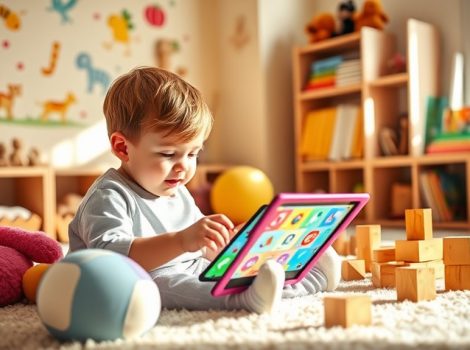The Early Childhood Education Secrets That Teachers Wish Parents Knew!
Teachers wish parents knew that understanding developmental milestones is crucial for supporting your child’s growth. Engaging in play isn’t just fun; it’s vital for creativity and social skills. Use communication strategies that encourage expression, fostering a safe space for your child. By creating an organized learning environment, you enhance their ability to explore independently. Encourage independence by allowing choices that build confidence. Lastly, partner with educators to enrich your child’s experience and reinforce what they learn at school. These insights can make a real difference, and exploring them further can unlock even more strategies for your parenting toolkit.
Key Takeaways
- Play is essential for learning; it fosters creativity, social skills, and emotional intelligence in children.
- Developmental milestones are crucial; early recognition helps identify areas needing support for cognitive and social growth.
- Active listening and engaging conversations promote deeper communication and enhance children’s emotional and cognitive development.
- Creating an organized learning environment stimulates exploration and maintains children’s interest in activities.
- Strong partnerships with educators enhance learning; open communication about your child’s strengths and challenges is vital.
Understanding Developmental Milestones
Understanding developmental milestones is crucial for any parent or caregiver navigating the early years of a child’s life. These milestones serve as vital signposts, helping you track your child’s growth in cognitive development and social skills. By recognizing these key stages, you can better support their emerging abilities and identify any areas needing attention.
In the realm of cognitive development, you’ll notice your child’s budding curiosity and problem-solving skills. From their first attempts at stacking blocks to more complex tasks like recognizing shapes, each achievement lays the foundation for future learning. Encourage exploration and provide age-appropriate challenges to foster this growth.
Social skills are equally important. As your child interacts with peers, they learn to share, empathize, and communicate. These interactions help them navigate relationships and build confidence. You’ll want to create opportunities for playdates or group activities where they can practice these skills in a safe environment.
The Importance of Play
As your child reaches various developmental milestones, play becomes a vital aspect of their growth. Through play, children engage in imaginative play, allowing them to explore their creativity and express their feelings. This kind of play isn’t just fun; it’s essential for developing critical cognitive and social skills.
When your child engages in imaginative play, they learn to navigate scenarios, solve problems, and even understand different perspectives. These experiences foster empathy and emotional intelligence, laying the foundation for strong relationships as they grow. Moreover, as children play with peers, they practice vital social skills, such as sharing, taking turns, and resolving conflicts. These interactions help them learn how to communicate effectively and build friendships.
Encouraging your child to engage in various forms of play—whether it’s role-playing, building with blocks, or playing games—provides opportunities for them to learn and grow. Remember, play isn’t just a break from learning; it’s a powerful tool that nurtures their overall development. By understanding the importance of play, you’ll create an environment that supports your child’s journey toward becoming a well-rounded individual.
Communication Strategies
Effective communication strategies can make a world of difference in your child’s early development. When you engage in conversations with your child, practice active listening. This means not just hearing their words but truly understanding their feelings and thoughts. Show them you value their perspective by nodding, maintaining eye contact, and reflecting back what they say. This creates a safe space where they feel heard and encourages them to express themselves openly.
In addition to listening, use positive reinforcement to nurture their growth. Celebrate their achievements, no matter how small, and provide specific praise. For example, instead of saying, “Good job!”, you might say, “I love how you shared your toys with your friends!” This not only boosts their confidence but also reinforces desirable behaviors.
Building a Learning Environment
Creating a nurturing learning environment is essential for your child’s development and curiosity. When you focus on sensory experiences, you ignite their natural desire to explore. Think about incorporating various textures, colors, and sounds in your child’s surroundings. This not only stimulates their senses but also fosters cognitive growth.
Effective classroom organization plays a crucial role in this process. Arrange materials and resources in a way that encourages independent exploration while also providing clear boundaries. Each area should cater to different activities—like reading, art, and science—allowing your child to choose how they want to learn.
Remember, your approach to learning space can significantly impact your child’s engagement. A well-organized environment reduces distractions, making it easier for them to focus on tasks. Use labels for storage to help your child understand where things belong, promoting responsibility and ownership of their space.
In addition, consider rotating materials regularly to keep the environment fresh and exciting. These small changes can make a big difference in maintaining your child’s interest and motivation to learn. By nurturing a thoughtfully organized space, you’re laying the foundation for a lifelong love of learning.
Encouraging Independence
Fostering independence in young children is crucial for their confidence and self-esteem. When you encourage your child to become more self-sufficient, you’re not just helping them learn how to tie their shoes or pour their cereal; you’re also instilling invaluable self-sufficient skills that will serve them throughout their lives.
Start small by allowing your child to make choices, whether it’s picking out their clothes or deciding what snack they want. These decisions, no matter how minor, can significantly boost their sense of agency and ownership.
You can also create opportunities for them to solve problems on their own. Instead of rushing in to help, ask guiding questions that lead them to discover solutions independently. This not only enhances their confidence but also strengthens their critical thinking skills.
Praise their efforts, not just the outcomes. Acknowledging their attempts, regardless of success, reinforces the idea that trying is just as important as achieving.
Partnering With Educators
Building a strong partnership with educators can have a profound impact on your child’s early learning experience. When you engage with teachers, you’re not just supporting your child; you’re actively participating in a collaborative effort that fosters their growth. Family engagement is crucial; it signals to your child that learning isn’t confined to the classroom.
To build this partnership, start by communicating openly with your child’s teacher. Share insights about your child’s interests, strengths, and challenges. This information is invaluable, allowing for tailored support and enhancing teacher collaboration. Attend parent-teacher meetings, volunteer in the classroom, or simply reach out via email. Your involvement shows your child that education is a shared priority.
Moreover, stay informed about the curriculum and learning goals. Understanding what your child is learning at school helps you reinforce those concepts at home. Ask teachers for resources or suggestions on activities that align with classroom lessons.
Frequently Asked Questions
How Can I Best Support My Child’s Learning at Home?
Imagine your home bustling with curiosity, filled with colorful books and creative projects. You can support your child’s learning by fostering engaging environments and being actively involved, nurturing their curiosity and growth every step of the way.
What Signs Indicate My Child May Need Extra Help?
If your child struggles to meet developmental milestones or shows persistent learning difficulties, like avoiding tasks or lacking interest, it’s vital to observe these signs. Early intervention can provide the support they need to thrive.
How Do Teachers Assess a Child’s Progress?
Did you know that 70% of learning occurs through observation? Teachers assess your child’s progress using formative assessments and observational techniques, allowing them to tailor support and ensure your child thrives in their educational journey.
What Role Do Siblings Play in Early Childhood Development?
Siblings play a crucial role in early childhood development through sibling dynamics and shared experiences. They teach cooperation, conflict resolution, and social skills, helping your child navigate relationships and learn valuable life lessons in a supportive environment.
How Can I Encourage My Child’s Creativity Outside of School?
To spark your child’s creativity, embrace artistic expression and imaginative play. Set up craft stations, encourage storytelling, or explore nature together. Each moment becomes a canvas, nurturing their unique vision and fostering endless possibilities.




